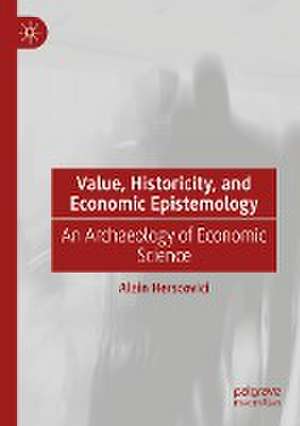Value, Historicity, and Economic Epistemology: An Archaeology of Economic Science
Autor Alain Herscovicien Limba Engleză Paperback – 5 ian 2024
| Toate formatele și edițiile | Preț | Express |
|---|---|---|
| Paperback (1) | 778.32 lei 6-8 săpt. | |
| Springer International Publishing – 5 ian 2024 | 778.32 lei 6-8 săpt. | |
| Hardback (1) | 782.42 lei 6-8 săpt. | |
| Springer International Publishing – 4 ian 2023 | 782.42 lei 6-8 săpt. |
Preț: 778.32 lei
Preț vechi: 949.17 lei
-18% Nou
Puncte Express: 1167
Preț estimativ în valută:
148.95€ • 154.62$ • 124.20£
148.95€ • 154.62$ • 124.20£
Carte tipărită la comandă
Livrare economică 24 martie-07 aprilie
Preluare comenzi: 021 569.72.76
Specificații
ISBN-13: 9783031211591
ISBN-10: 3031211596
Ilustrații: XXI, 228 p. 13 illus., 6 illus. in color.
Dimensiuni: 148 x 210 mm
Greutate: 0.34 kg
Ediția:1st ed. 2023
Editura: Springer International Publishing
Colecția Palgrave Macmillan
Locul publicării:Cham, Switzerland
ISBN-10: 3031211596
Ilustrații: XXI, 228 p. 13 illus., 6 illus. in color.
Dimensiuni: 148 x 210 mm
Greutate: 0.34 kg
Ediția:1st ed. 2023
Editura: Springer International Publishing
Colecția Palgrave Macmillan
Locul publicării:Cham, Switzerland
Cuprins
1. Introduction.- Part I An Archeology Of Economic Science: From Physiocrats To Neoclassics.- 2. History Of Sciences And Epistemology.- 3. From Physiocratic School To Neoclassical Economy.- 4. The Different Epistemological Trajectories: From Archeology To Genealogy.- Part II Epistemological Ruptures: Three Contemporary Examples.- 5 The Refutation Of The Neoclassical Macroeconomics From The Neo-Ricardian Approach.- 6 Hayek And The Neoclassical Economy: Some Dangerous Liaisons?.- 7 Money, Finance And Real Economy.- 8 Beyond Episteme: The Concept Of Order.- 9 General Conclusion.
Notă biografică
Alain Herscovici is Full Professor of the Department of Economics and the Postgraduate Program in Economics, at the Federal University of Espírito Santo (UFES), Brazil, and leader of the CNPq (National Council for Scientific and Technological Development) Research Group on Macroeconomics. He is the author of Essays on the Historicity of Capital, published by Palgrave Macmillan in 2019.
Textul de pe ultima copertă
This book aims to study, from an approach linked to epistemology and the history of ideas, the evolution of economic science and its differing seminal systems. Today mainstream economics solves certain problems chosen within the scope of “normal science,” without questioning the epistemological foundations that support the paradigm within which they were conceived. Contrary to a Neoclassical interpretation, the historicist interpretation shows that, from the incommensurability of the different paradigms, it is impossible to conceive of a progress of economic science, in a long-term perspective. This book ultimately reveals, from the different economic schools of thought analyzed, that there is no pure form of episteme, or system of understanding. Each concrete episteme in the history of economic thought is by nature hybrid in the sense that it contains components from preceding systems of knowledge.
Alain Herscovici is Full Professorof the Department of Economics and the Postgraduate Program in Economics, at the Federal University of Espírito Santo (UFES), Brazil, and leader of the CNPq (National Council for Scientific and Technological Development) Research Group on Macroeconomics. He is the author of Essays on the Historicity of Capital, published by Palgrave Macmillan in 2019.
Alain Herscovici is Full Professorof the Department of Economics and the Postgraduate Program in Economics, at the Federal University of Espírito Santo (UFES), Brazil, and leader of the CNPq (National Council for Scientific and Technological Development) Research Group on Macroeconomics. He is the author of Essays on the Historicity of Capital, published by Palgrave Macmillan in 2019.
Caracteristici
Explores the long-term evolutions of economic thought through the concept of episteme, or system of understanding Highlights the epistemological discontinuities and ruptures that characterize evolutions of economic thought Looks at different heterodox schools and their relationship with the neoclassical paradigm Foreword was written by Sheila Dow
